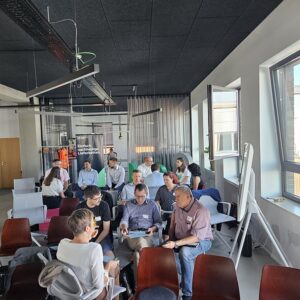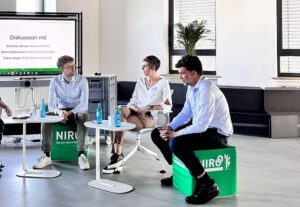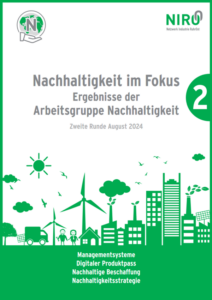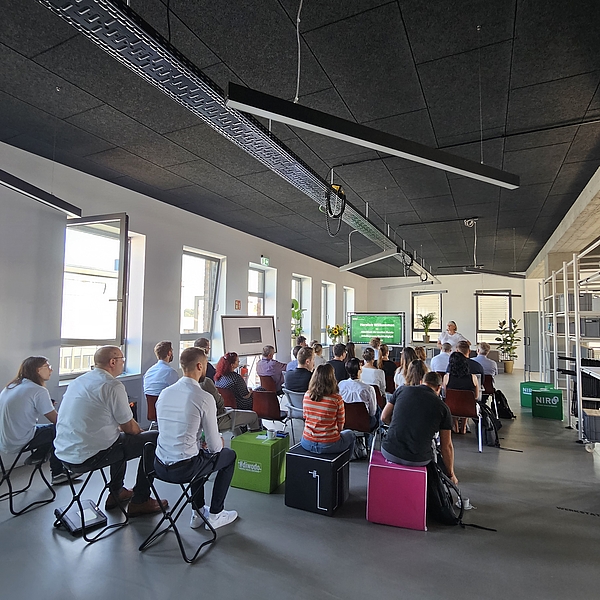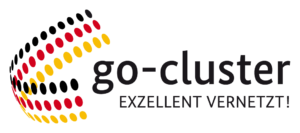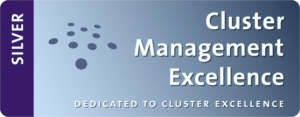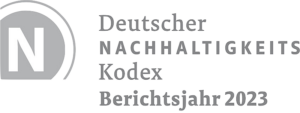This year, around 30 managers from companies and organizations came together to find out more about the results of the project groups, discuss current topics and gather new focus areas for the future. In the best summer weather, the focus was on the topic that is now of intense concern to all companies: How can we do business more sustainably? Since November 2023, managers from a total of 17 of our member companies have come together on an interdisciplinary basis to work together in four self-organized project groups on the topics of management systems, Digital Product Passport (DPP), sustainable procurement and sustainability strategy. Regular online status meetings kept the entire group informed about progress in the individual groups. In addition, on-site meetings at our member companies flanked the larger meetings in person, where current focal points were discussed in more detail.
Our Managing Director Ingrid Lange welcomed the group and thanked the four project groups for their commitment.
The current results of the project groups
On this morning, the four project groups presented their results to a wider audience. They traced the path to achieving their results and reflected on positive and negative aspects of the collaboration. A clear brochure summarizing the most important results at a glance is available for all interested companies. Click here to download: Results of the sustainability working group 2nd round August 2024 One of our project groups dealt with the question of how sustainability can be integrated into management systems. Among other things, it drew up a clear comparison of the individual standards and their requirements. One finding from this project group: the integration of sustainability aspects into existing management systems for quality, environment, occupational health and safety and energy (IMS) is easy to implement. Companies have the opportunity to make their sustainable practices efficient and coherent by using and expanding existing structures. Although it is currently unclear whether ISO 53001 as “Management Systems for UN Sustainable Development Goals – Requirements” will actually be introduced by fall 2025, sustainability aspects could be taken into account in future revisions of existing management standards. The second group focused on the Digital Product Passport (DPP). In the European Union, the “European Green Deal” and the “Circular Economy Action Plan” have given new impetus to product policy. Both strategy documents see an electronic or digital product passport as a key tool for an environmentally friendly and resource-efficient economy. This passport should provide information such as the origin, composition, repair and dismantling options of a product as well as its treatment at the end of its life. The DPP is of concern to many companies and the group worked out a clear overview of the different types of environmental product assessment and developed a project profile and a project phase plan. Both forms can help companies to implement a Digital Product Passport. The third group continued the work of the previous project group on sustainable procurement. It focused on the Supply Chain Sustainability Act (LkSG), which obliges companies to take responsibility for their business activities. The law aims to protect human rights and the environment worldwide by ensuring that human rights and environmental due diligence obligations are observed in supply chains. The second round of this project group focused on selected topics and due diligence obligations. The results are various documents that can support the practical implementation of the LkSG, including a process description for compliance with the German Supply Chain Act. The fourth project group dealt with the broad field of sustainability strategy. As different as companies may be, they all have one thing in common: a sustainability strategy is of central importance for every company, regardless of whether or not it is subject to the reporting obligation under the Corporate Sustainability Reporting Directive (CSRD).
A good sustainability strategy increases resilience in times of rapid change, enables a rapid response to constantly changing requirements and can help companies to become or remain sustainable. A sustainability narrative summarizes the goals, actions and measures. As a result, the group provided an overview of how management and project leaders can orient themselves on four key elements. In addition to our brochure, which summarizes the most important results of the four project groups, further information and documents can be found in NIRO Knowledge.
Topics on the podium: circular economy, transparent supply chains and automated carbon footprinting
After a short break, a panel discussion picked up on current topics.
Christian Dinter (Managing Director of Rodiek & Co. GmbH), Katrin Ostheimer (Head of Partner Management at Integrity Next GmbH) and Claas Voigt (Managing Director of Telusio GmbH) took part in the panel discussion. It was clear from the lively discussion and many of their assessments that a great deal has already been achieved, but there is still a lot more room for improvement. Ten years ago, sustainability was not (yet) a big issue, but today almost all companies have recognized the need for action. Sustainability is a big word that could do with a lot more positive ideas and links and should not be perceived predominantly as a burden, but rather as an asset and potential for improvement. The circular economy: a concept that, if thought through to the end, can make our use of resources much more sustainable and preserve them. The first steps have been taken, but here too, implementation will take longer than often hoped. Recycling and recyclates: yes, there is much to be said for this, but alternative recyclable materials must fulfill the necessary functions. The recycling industry is currently facing many challenges; shredding is still the order of the day. There are always hopeful moments that a lot will continue to happen: Even small measures lead to success. As far as the future is concerned, artificial intelligence (AI) will open up many possibilities that are at best imaginable today. With a constantly growing amount of data available and new software solutions that make supply chains more transparent and enable data-drivenCO2 analyses, further innovative applications are conceivable and desirable.
What new topics are on the agenda and what will happen next?
How should sustainable focus topics be dealt with in our network in the future? In order to clarify this, after a short break there was a “marble round” in which individual small groups collected possible new topics. A small excerpt: The management systems working group will be continued. This was also requested for the topic of sustainability reporting and materiality analysis. Individual aspects are to be considered in exchanges of experience and information events, including options forCO2 compensation, change management on the topic of AI, experiences with EcoVadis assessments and a list of possible sustainable measures. NIRO will tackle a selection of these and other topics in various formats. We are planning a new experiment on the topic of collaboration for the autumn: we will regularly open our harbor room as a real coworking space where anyone interested can come together to work on their day-to-day business.
This morning once again revealed what makes working in our network so special: things are better together, the wheels of others are often adaptable and usable, sharing experiences and knowledge is fun and motivates us to do more. We would like to take this opportunity to thank everyone who actively participated in this working group and contributed to the valuable results.
